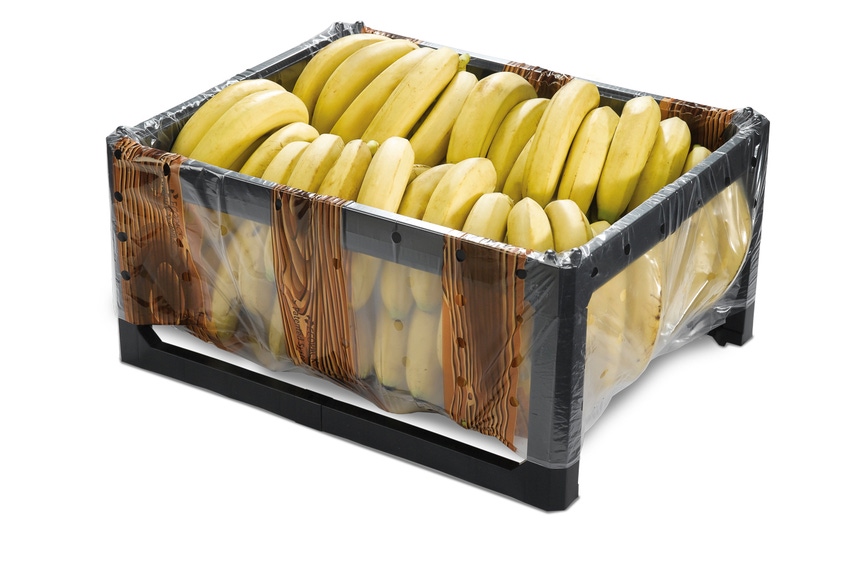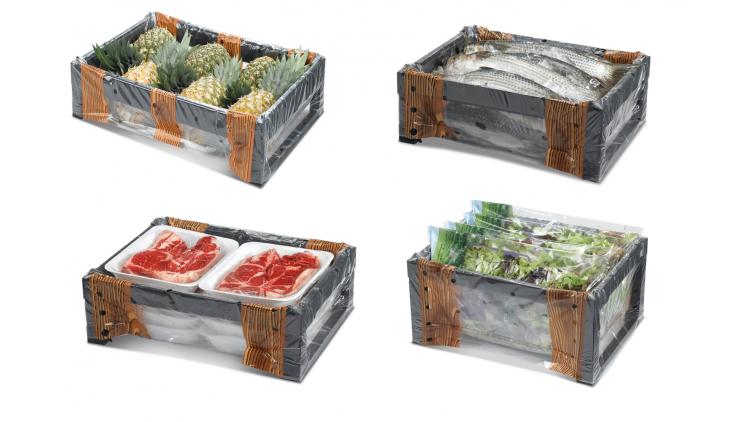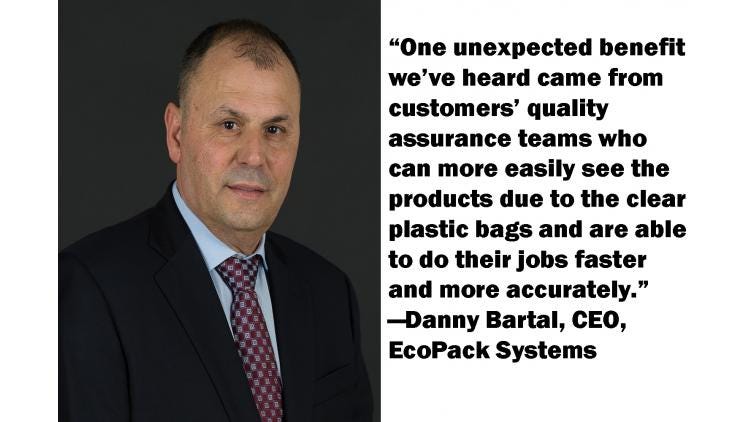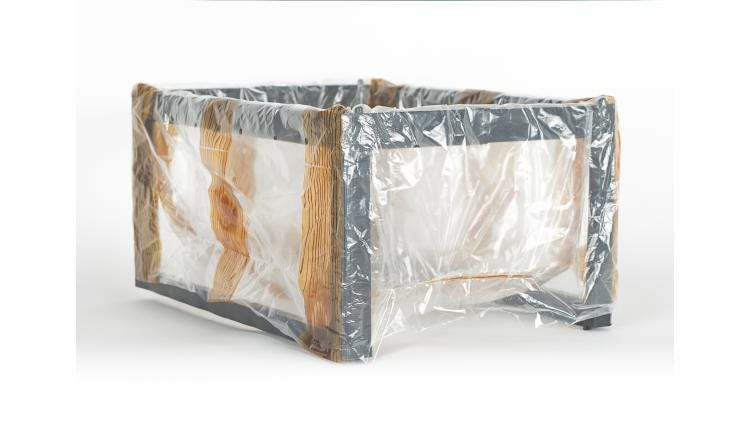Unique food crate with supply-chain benefits takes root
May 23, 2018

Patented EcoPack packaging addresses sanitation, sustainability and other transportation challenges for fruits, vegetables, meat and other commodity foods in a graphics-friendly, reusable frame-and-bag crate format.
A unique and patented food packaging option for supply chain distribution channels introduced last October by EcoPack Systems (Irvine, CA) now offers a new product, the EcoPack Pineapple Crate, at locations in Costa Rica and California, an outgrowth of growing demand from suppliers in Central America and the Western United States.
While initial markets of focus for the EcoPack “box” have been for bananas and pineapples, other fruits and vegetables as well as seafood, baked goods, dairy and fresh meat and poultry are also potential markets.
Made from food-grade plastics, the EcoPack crates address food safety in the supply chain and are said to dramatically reduce transportation costs while offering fully customizable point of purchase branding through printed graphics.
The patented EcoPack system consists of an easy-to-assemble plastic frame and a hygienic plastic bag that together form an economical, multipurpose recyclable box that’s suitable for palletizing. The fall launch featured two film sleeves as the liner, but that has been simplified to a single double-ply-polyethylene bag that's customized for the specific commodity and product application, and designed for optimal ventilation, food safety and waste reduction. There are currently multiple sizes with three base dimensions at several heights, plus a unique crate for bananas.

Benefits of EcoPack packaging include:
Recyclable: 100% reusable packaging that can be recycled indefinitely;
Weight: 50% less than similar cardboard or plastic packaging;
Economical: 30%-70% lower cost than competing packaging systems, as the frame is reusable and only the recyclable bag needs to be replaced;
Hygienic: New, clean box every time, with an optional, fully organic biodegradable bag;
Green: Lower energy requirements for production and in transportation than any other solution;
Versatile: Suitable for a wide variety of products including fruit, vegetables, seafood, baked goods, dairy, and fresh meat and poultry;
Customizable: Fully adaptable bags for a wide variety of merchandising applications.
“The EcoPack box is efficient, clean, has multiple uses and is recyclable,” says Danny Bartal, CEO of EcoPack Systems. “It’s perfect for fresh produce retailers, grower/shippers, exporters and other distributors and suppliers. We believe it provides a financially preferable alternative to [corrugated] boxes and plastic crates now prevalent in the industry. The response to the new EcoPack Pineapple Crate has been overwhelmingly positive and we’re already looking to develop similar solutions for other commodities.” Bartal provides additional details in a Packaging Digest interview.

How far along is EcoPack’s market penetration?
Bartal: We’ve had a lot of success with fresh-cut food processers, companies that receive whole fruit and vegetables then process them for sale to retailers and foodservice operators. We’re also shipping to retailers in Mexico and making inroads with retailers and distributors in the U.S. We expect to have our crates being used by major American retailers in their supply chains within six months to a year.
Of what polymer/plastic is the frame made (injection molded?)?
Bartal: The frame is injection molded polypropylene and the bag are made from food-grade polyethylene. Both materials are recyclable, so our crates never enter the waste stream.
Are customers leveraging the “branding” aspects of the packaging?
Bartal: Some of the importers and processers are putting their logos on the bags for marketing purposes. The images are printed on the bags when they are being produced, which makes the merchandising opportunities limited only by your imagination.
Has any unforeseen benefit been uncovered by customers?
Bartal: One unexpected benefit we’ve heard from the use of our crates came from the quality assurance teams at our customers. Their inspectors can more easily see the products due to the clear plastic bags and are able to do their jobs faster and more accurately.
Because of their size and low weight, EcoPack crates allow shippers to stack more layers on each pallet and on every truck, which lowers their carbon footprint dramatically.

Do you have any quantifiable data such as a Life Cycle Assessment or similar showing the supply-chain sustainable benefits of the EcoPack system?
Bartal: We are in the process of measuring the impact of EcoPack crates on the environment compared to corrugated boxes and resusable plastic containers (RPCs), but we can report that our crates are made of 100% reusable packaging that can be recycled indefinitely. There are lower energy requirements for production of our crates than any other solution and because they weigh 50% less than similar [corrugated] or plastic packaging our crates reduce transportation costs and related emissions.
What’s the takeaway for our readers?
Bartal: Our vision is to make the EcoPack System a global industry standard for the safer, greener, healthier transportation of fresh and processed foods. Our solution is less costly compared to the existing and there is a long list of benefits for all trading partners.
More information on EcoPack Systems packaging is available at www.ecopack-greenbox.com.
___________________________________________________________________________________
Hungry for packaging information and ideas? During EastPack 2018 (June 12-14, New York City) you’ll find a 3-day packaging conference, demos, networking opportunities and expert-led Innovation Tours.
You May Also Like


